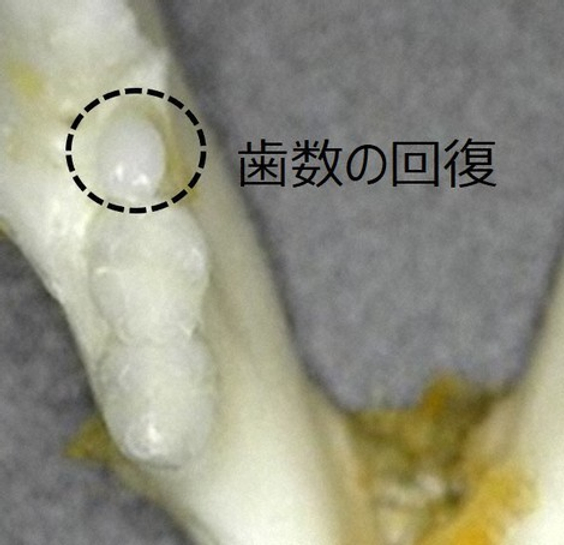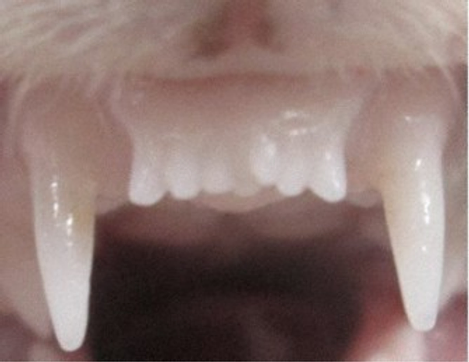
Posted on 10/12/2024 7:09:38 PM PDT by Red Badger
A team of pioneering researchers is making remarkable strides toward developing a drug that could trigger the growth of new teeth in humans.
A revolutionary milestone in dentistry and genetics has set the stage for transformative medical treatments.
The team of pioneering Japanese researchers, led by Katsu Takahashi, is making remarkable strides toward developing a drug that could trigger the growth of new teeth in humans. This groundbreaking discovery has the potential to reshape dental care worldwide, offering new hope to millions dealing with hereditary dental issues.
The clinical trial has sparked excitement across the global scientific community, with the aim of making the drug widely available by 2030.
Takahashi, who is the head of the dentistry and oral surgery department at the Medical Research Institute Kitano Hospital in Osaka, is a pivotal figure in this unprecedented research. The potential for tooth regeneration has been a lifelong dream of his, one he has tirelessly pursued since his days as a graduate student.
"The idea of growing new teeth is every dentist's dream. I've been working on this since I was a graduate student. I was confident I'd be able to make it happen," Takahashi shared, revealing his unwavering determination to create a dentistry revolution.
The objective of this groundbreaking medication is to aid individuals who, due to congenital factors, have fewer than a full set of adult teeth—a condition known as anodontia. Approximately 1% of the world's population suffers from this condition, a significant number of whom are anodontia patients missing six or more teeth, categorizing them under a condition called oligodontia.
Tooth agenesis, which includes both anodontia and oligodontia, poses significant challenges for those affected. Struggles with fundamental functions such as chewing, swallowing, and speaking are common, often impacting their development from a young age. Takahashi's proposed tooth regrowth medication could be a life-changing solution for such individuals.
Takahashi, who commenced his illustrious career in the field of dentistry, later specialized in molecular biology at Kyoto University in 1991. His academic journey then led him to the United States, where his interest in genetic influences on tooth growth began to take root.
At that time, scientific research was just starting to identify specific genes whose deletion could cause genetically modified mice to grow fewer teeth. This revelation was a eureka moment for Takahashi, who quickly realized the potential for altering the number of teeth an individual has by targeting that gene.

A new tooth is seen growing in a mouse treated with the tooth regrowth medicine. (CREDIT: Katsu Takahashi) His groundbreaking research drew global attention around 2005 when he continued his work at Kyoto University after returning from the U.S. The team discovered that mice lacking a specific gene developed an increased number of teeth, and a protein called USAG-1, synthesized by this gene, appeared to limit tooth growth.
Following this discovery, Takahashi and his team developed an antibody-based medicine that can neutralize the USAG-1 protein. They discovered in 2018 that this medicine could indeed induce the growth of new teeth in mice with a congenitally low number of teeth. These results were published in a renowned U.S. scientific journal in 2021, grabbing the world's attention as the first steps towards tooth regeneration medicine.
As we approach the present day, work is underway to ready the drug for human trials. If the drug passes all necessary safety checks without any adverse effects, it will be aimed at treating children aged 2 to 6 who exhibit anodontia. "We hope to pave the way for the medicine's clinical use," Takahashi said.
This ground-breaking medicine could be a game-changer for the entire field of dentistry. It is widely known that certain species of animals, such as sharks and some reptiles, can continuously regrow their teeth. While it is generally accepted that humans can only grow two sets of teeth, recent research has indicated the potential presence of a third set of "buds."

The front teeth of a ferret treated with tooth regrowth medicine. The medicine induced the growth of an additional seventh tooth (center). (CREDIT: Katsu Takahashi) Around 1% of the population experiences hyperdontia—a congenital condition that leads to a higher-than-normal number of teeth. According to Takahashi's research, one in three cases of hyperdontia results in the growth of a third set of teeth, suggesting the ability to grow a third set of teeth may have been lost over time in humans.
Through further experimentation, the research team discovered that when the medicine was applied to ferrets, an additional tooth was grown. These new teeth grew between the existing front teeth and were of similar shape, suggesting that the medicine could induce the growth of a third set of teeth.
Currently, when teeth become untreatable due to severe cavities or pyorrhea—a disease leading to erosion of dental sockets—individuals often resort to dental appliances such as dentures. The ability to grow a third set of teeth could revolutionize this approach. "In any case, we're hoping to see a time when tooth-regrowth medicine is a third choice alongside dentures and implants," Takahashi said, outlining his ambitious vision for the future of dentistry.
The extraordinary work of Takahashi and his team marks an exciting new chapter in medical science, with potential ramifications extending beyond dentistry. As we await the clinical trials in 2024, this innovative research promises a future where tooth loss could become a thing of the past, making tooth regrowth a reality for the countless individuals affected by congenital dental disorders.
Note: Materials provided above by The Brighter Side of News. Content may be edited for style and length.
The whole field of regenerative medicine has huge promise. I don’t expect it overnight, but cracking the code that will enable people to regrow healthy organs or limbs or nerve tissue will eventually work miracles for all sorts of injuries and ailments.
That making sure a child is fed properly results in better teeth?
Or that growing a new set would require you to supplement your diet with various vitamins to keep the process from depleting your adult body?
Because both of those things are kind of self evident.
I am not sure what you are trying to argue here.
[... still have a baby tooth...]
I know a family that has several members that never grew adult teeth. The baby teeth are fine, just are small and never fell out. Dentist told them it was a very rare genetic issue.
Gums I need GUMS then won’t lose the teeth!!
This past week I just finished a complete dental restoration. It was 3+ years in the making with orthodontics and restorative dental work. While I have that hollywood smile now, I often wondered what it would be like pulling the teeth and regenerating them instead. Imagine no more ortho work and things like implants or crowns being things of the “ancient” past.
Growth limited to the mouth or ... ?
That is the goal but imagine teething pains for six months in your fifties. :)
So you take this medicine.
And it processes throughout your system.
And some collects at your ‘exit port’.
Will you grow some teeth there?
I came in here expecting the photo of Beldar Conehead’s visit to the dentist.
Not arguing anything.
There are some instances
where nutrishinal
supplements will not have an
effect on guaranteeing a
healthy set of choppers.
Disclaimer: Opinions posted on Free Republic are those of the individual posters and do not necessarily represent the opinion of Free Republic or its management. All materials posted herein are protected by copyright law and the exemption for fair use of copyrighted works.